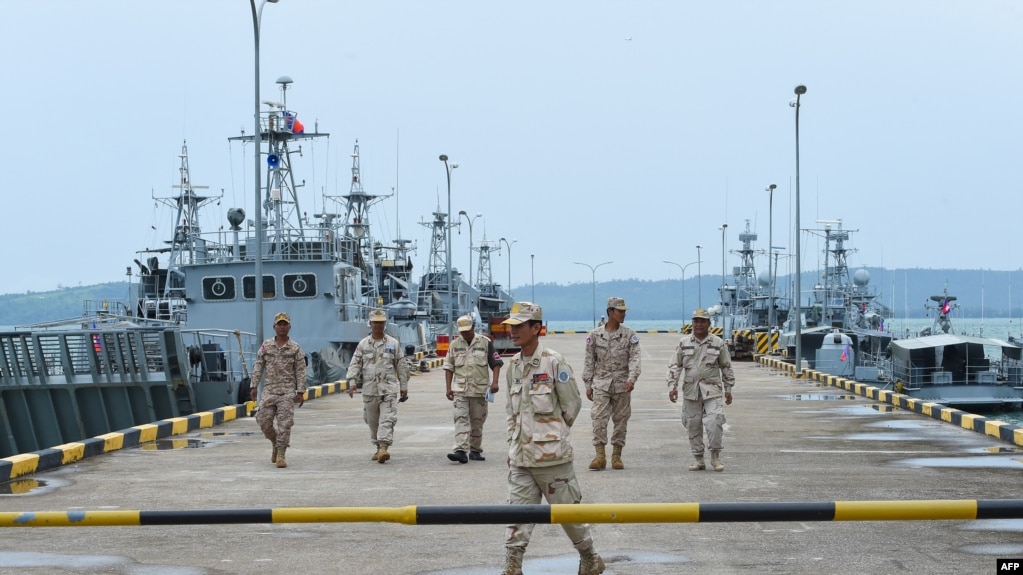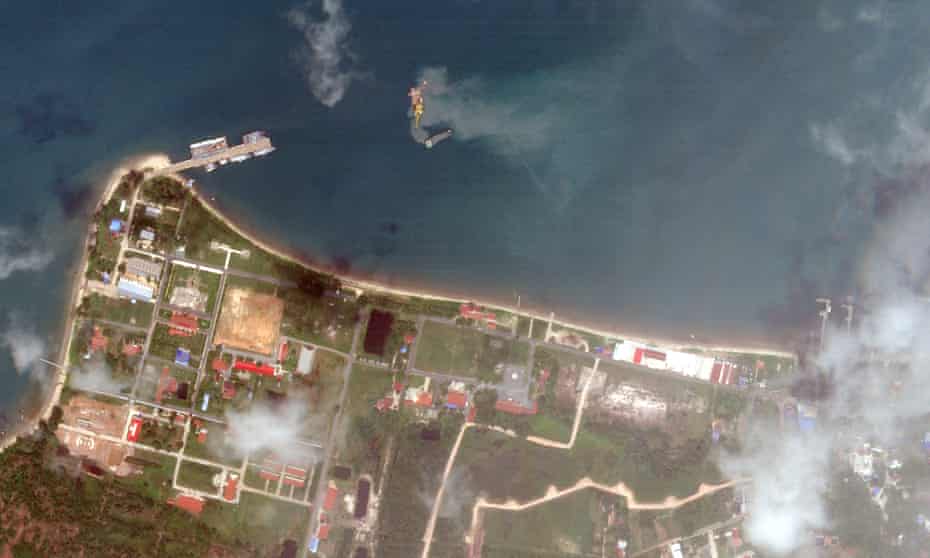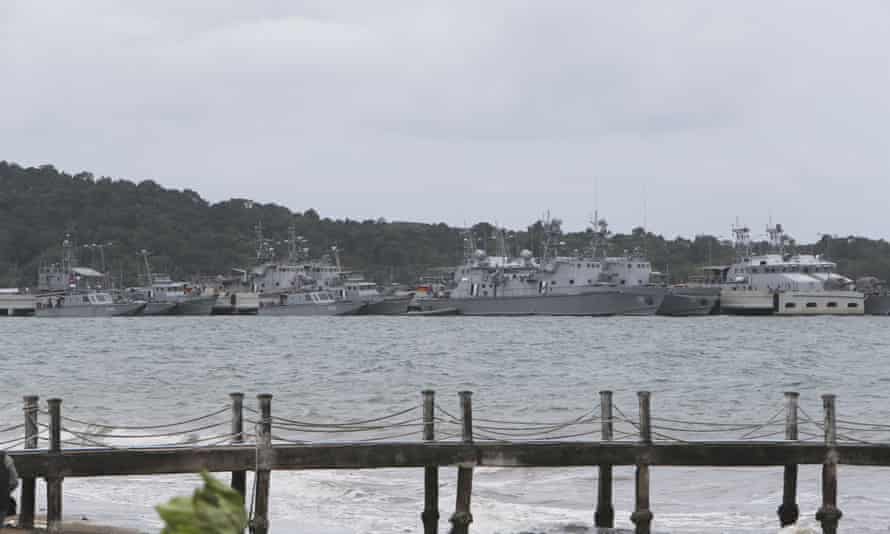June 08, 2022
Agence France-Presse

Cambodian navy personnel walk on a jetty in Ream naval base in Preah Sihanouk province during a government organized media tour, July 26, 2019.
Cambodia and China on Wednesday broke ground on a Beijing-funded project to revamp a naval base that the U.S. fears is intended for Chinese military use.
The Washington Post this week cited unnamed Western officials as saying the new facilities at Cambodia's Ream base -- strategically located on the Gulf of Thailand -- were being built for the "exclusive" use of the Chinese navy.
Both countries deny the allegation, with Phnom Penh saying the base's development is "not a secret."
Cambodian Defense Minister Tea Banh and Chinese Ambassador Wang Wentian were on hand Wednesday to see work commence on the new facilities including a boat maintenance workshop, two piers, a dry dock, slipway, and sand dredging for bigger ships to dock.
Heavy construction machinery was visible at the site.
"It is not targeted at any third party, and will be conducive to even closer practical cooperation between the two militaries, better fulfillment of international obligations and provision of international public goods," Wang said.
The project, paid for with a Chinese grant, also includes upgrading and expanding a hospital as well as donations of military equipment and repair of eight Cambodian warships, Tea Banh said.
"There are allegations that the modernized Ream base will be used by the Chinese military exclusively. No, it is not like that at all," the minister told several hundred people including foreign diplomats at the ceremony.
"Don't worry too much, the Ream base is very small... It won't pose a threat to anyone, anywhere."
The revamp will be finished in two years, another Cambodian official said.
Wang said it would deepen the iron-clad friendship between the two countries and help modernize the Cambodian navy.
The base has been a sore spot in U.S.-Cambodia relations for years, with Washington suspecting it is being converted for use by China as Beijing seeks to buttress its international influence with a network of military outposts.
U.S. embassy spokeswoman Stephanie Arzate said the United States and other countries in the region had "expressed concern about the lack of transparency on the intent, nature, and scope of this project," as well as China's role in its construction.
"An exclusive PRC military presence at Ream could threaten Cambodia's autonomy and undermine regional security," Arzate told AFP.
Concerns about the base go back as far as 2019, when the Wall Street Journal reported on a secret draft deal allowing Beijing to dock warships there.
Cambodia has since dismantled facilities at the base that were built partly with American money and played host to U.S. military exercises.
Cambodia and China deny naval base scheme as Australian PM voices concern
Cambodia says facilities at Ream naval base will not be for exclusive use of Chinese military, while Beijing denounces ‘malicious conjecture’

Cambodia and China on Wednesday broke ground on a Beijing-funded project to revamp a naval base that the U.S. fears is intended for Chinese military use.
The Washington Post this week cited unnamed Western officials as saying the new facilities at Cambodia's Ream base -- strategically located on the Gulf of Thailand -- were being built for the "exclusive" use of the Chinese navy.
Both countries deny the allegation, with Phnom Penh saying the base's development is "not a secret."
Cambodian Defense Minister Tea Banh and Chinese Ambassador Wang Wentian were on hand Wednesday to see work commence on the new facilities including a boat maintenance workshop, two piers, a dry dock, slipway, and sand dredging for bigger ships to dock.
Heavy construction machinery was visible at the site.
"It is not targeted at any third party, and will be conducive to even closer practical cooperation between the two militaries, better fulfillment of international obligations and provision of international public goods," Wang said.
The project, paid for with a Chinese grant, also includes upgrading and expanding a hospital as well as donations of military equipment and repair of eight Cambodian warships, Tea Banh said.
"There are allegations that the modernized Ream base will be used by the Chinese military exclusively. No, it is not like that at all," the minister told several hundred people including foreign diplomats at the ceremony.
"Don't worry too much, the Ream base is very small... It won't pose a threat to anyone, anywhere."
The revamp will be finished in two years, another Cambodian official said.
Wang said it would deepen the iron-clad friendship between the two countries and help modernize the Cambodian navy.
The base has been a sore spot in U.S.-Cambodia relations for years, with Washington suspecting it is being converted for use by China as Beijing seeks to buttress its international influence with a network of military outposts.
U.S. embassy spokeswoman Stephanie Arzate said the United States and other countries in the region had "expressed concern about the lack of transparency on the intent, nature, and scope of this project," as well as China's role in its construction.
"An exclusive PRC military presence at Ream could threaten Cambodia's autonomy and undermine regional security," Arzate told AFP.
Concerns about the base go back as far as 2019, when the Wall Street Journal reported on a secret draft deal allowing Beijing to dock warships there.
Cambodia has since dismantled facilities at the base that were built partly with American money and played host to U.S. military exercises.
Cambodia and China deny naval base scheme as Australian PM voices concern
Cambodia says facilities at Ream naval base will not be for exclusive use of Chinese military, while Beijing denounces ‘malicious conjecture’

Satellite image from Planet Labs PBC shows a Cambodian naval base in Ream, Cambodia, on 25 April 2022.
Photograph: Planet Labs PBC/AP
Agence France-Presse
Agence France-Presse
Wed 8 Jun 2022
Chinese and Cambodian officials attended a ceremony for a controversial naval port expansion on Wednesday, dismissing reports that the base will provide a crucial strategic foothold for Beijing.
Officials broke ground at the Ream naval base, turning over shovels of dirt as work commenced on a China-funded renovation of Ream, Cambodia’s biggest naval base.
The Washington Post reported earlier this week that the new facility was being built for the “exclusive” use of the Chinese navy, citing unnamed western officials.
China has only one other foreign naval base, in the east African country of Djibouti, and a presence in Cambodia would mark a significant expansion of its military influence in the Indo-Pacific.
Both Cambodia and China have denied the reports. The Cambodian defence minister, Tea Banh, said on Wednesday that the base was very small and “won’t pose a threat to anyone, anywhere”.
“There are allegations that the modernised Ream base will be used by the Chinese military exclusively. No, it is not like that at all,” he said.
Washington has long suspected that Beijing will use Ream as a base, allowing it to strengthen its access to the contested South China Sea and expand its clout in the region. Last year, the US accused Cambodia of not being transparent about China’s involvement in the facility.
Australia’s new prime minister, Anthony Albanese, has also raised alarm, describing Cambodia’s reported arrangement with China as “concerning”.
The port expansion, which will reportedly be completed in two years, will include a boat maintenance workshop, two piers, a dry dock, slipway, and sand dredging for bigger ships to dock.
“It is not targeted at any third party, and will be conducive to even closer practical cooperation between the two militaries, better fulfilment of international obligations and provision of international public goods,” said China’s ambassador to Cambodia, Wang Wentian.
Wang added it would deepen the iron-clad friendship between the two countries and help modernise the Cambodian navy.
“China and Cambodia have become ironclad brothers, economical with words but generous in action, treating each other with all sincerity and standing side by side at challenging times,” he said.
The Cambodian prime minister, Hun Sen, has for years denied that Cambodia could host a Chinese naval base, stating that the country’s constitution prohibits foreign military facilities.
Hun Sen, who has ruled the country for more than 37 years, has built close ties with China, and accepted billions of dollars in infrastructure loans and business deals with Beijing.
Chinese and Cambodian officials attended a ceremony for a controversial naval port expansion on Wednesday, dismissing reports that the base will provide a crucial strategic foothold for Beijing.
Officials broke ground at the Ream naval base, turning over shovels of dirt as work commenced on a China-funded renovation of Ream, Cambodia’s biggest naval base.
The Washington Post reported earlier this week that the new facility was being built for the “exclusive” use of the Chinese navy, citing unnamed western officials.
China has only one other foreign naval base, in the east African country of Djibouti, and a presence in Cambodia would mark a significant expansion of its military influence in the Indo-Pacific.
Both Cambodia and China have denied the reports. The Cambodian defence minister, Tea Banh, said on Wednesday that the base was very small and “won’t pose a threat to anyone, anywhere”.
“There are allegations that the modernised Ream base will be used by the Chinese military exclusively. No, it is not like that at all,” he said.
Washington has long suspected that Beijing will use Ream as a base, allowing it to strengthen its access to the contested South China Sea and expand its clout in the region. Last year, the US accused Cambodia of not being transparent about China’s involvement in the facility.
Australia’s new prime minister, Anthony Albanese, has also raised alarm, describing Cambodia’s reported arrangement with China as “concerning”.
The port expansion, which will reportedly be completed in two years, will include a boat maintenance workshop, two piers, a dry dock, slipway, and sand dredging for bigger ships to dock.
“It is not targeted at any third party, and will be conducive to even closer practical cooperation between the two militaries, better fulfilment of international obligations and provision of international public goods,” said China’s ambassador to Cambodia, Wang Wentian.
Wang added it would deepen the iron-clad friendship between the two countries and help modernise the Cambodian navy.
“China and Cambodia have become ironclad brothers, economical with words but generous in action, treating each other with all sincerity and standing side by side at challenging times,” he said.
The Cambodian prime minister, Hun Sen, has for years denied that Cambodia could host a Chinese naval base, stating that the country’s constitution prohibits foreign military facilities.
Hun Sen, who has ruled the country for more than 37 years, has built close ties with China, and accepted billions of dollars in infrastructure loans and business deals with Beijing.

Cambodian warships are docked at Ream naval base in Sihanoukville, Cambodia. Photograph: Heng Sinith/AP
Relations between Cambodia and the US, however, have become strained, as Washington has criticised his authoritarian leadership, and crackdown on opposition voices.
After the ceremony, the US embassy in Phnom Penh warned that a Chinese “military presence at Ream could threaten Cambodia‘s autonomy and undermine regional security”.
“The US and countries in the region have expressed concern about the lack of transparency on the intent, nature, and scope of this project as well as the role the PRC military is playing in its construction and in post-construction use of the facility,” an embassy spokesperson told the Associated Press.
The US has more foreign military bases than any other country, with hundreds around the world, including multiple facilities in the Asia-Pacific region.
Relations between Cambodia and the US, however, have become strained, as Washington has criticised his authoritarian leadership, and crackdown on opposition voices.
After the ceremony, the US embassy in Phnom Penh warned that a Chinese “military presence at Ream could threaten Cambodia‘s autonomy and undermine regional security”.
“The US and countries in the region have expressed concern about the lack of transparency on the intent, nature, and scope of this project as well as the role the PRC military is playing in its construction and in post-construction use of the facility,” an embassy spokesperson told the Associated Press.
The US has more foreign military bases than any other country, with hundreds around the world, including multiple facilities in the Asia-Pacific region.
No comments:
Post a Comment